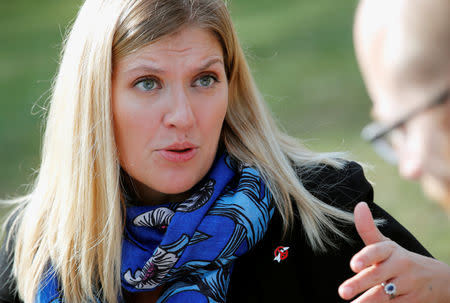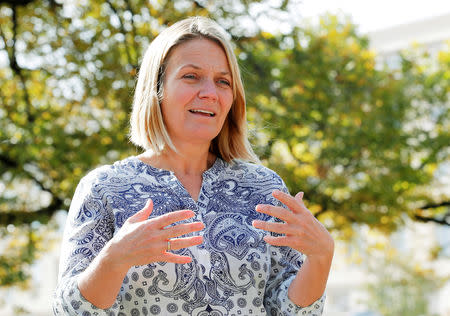Nuclear ban treaty could come into force in 2019, campaigners say
By Tom Miles
GENEVA (Reuters) - A treaty banning nuclear weapons could come into force by the end of 2019, backers of a campaign that won the 2017 Nobel Peace Prize said in an annual progress report on Monday.
The treaty aims to stigmatise nuclear weapons as previous treaties marginalised landmines and cluster munitions. Signatories promise to reject nuclear strategies and encourage others to follow suit.
The Nuclear Weapons Ban Monitor, published by Norwegian People's Aid, said 19 states had already adhered to the 2017 Treaty on the Prohibition of Nuclear Weapons, putting it well on the way to the 50 ratifications it needs to come into force.
"We’re pushing for getting 50 ratifications by the end of 2019," said Beatrice Fihn, executive director of the International Campaign to Abolish Nuclear Weapons.
"We have about 25, 30 countries that say that they will be ready by the end of 2019, so it’s definitely possible."
The big nuclear powers oppose the treaty because they say it could undermine nuclear deterrence, which they credit with preventing conventional war. Fihn told Reuters such arguments were ridiculous scaremongering.
"If you follow that argument, that more nuclear weapons keeps us safer, then why have a problem with North Korea having nuclear weapons?," she said.
"It’s a little bit like the gun debate in the United States – you feel safer, but all statistics and logic say that you are more likely to be shot if you have a weapon at home."
U.S. President Donald Trump has employed a high-stakes nuclear strategy to face down North Korea and Iran, and said on Oct. 20 that Washington planned to quit the Intermediate-Range Nuclear Forces (INF) treaty which Mikhail Gorbachev, the last Soviet leader, and Ronald Reagan signed in 1987.
Fihn said the INF prohibited missiles that were "meant to wipe out cities in Europe" and the new nuclear arms race made it urgent for countries to ratify the ban treaty.
The report identified 127 states as supporters of the treaty, especially in Africa and Latin America.
"The Europeans are the problem," said Fihn.
Grethe Ostern, the report's editor, said the treaty was compatible with NATO membership, but it was seen as disloyal to question the usefulness of nuclear weapons, and states were under pressure to oppose it.
"We know that states sometimes feel that development aid is sometimes put in the balance. We know that they feel that if they have visa arrangements with the U.S., for instance, they feel that this is in the balance," Ostern said.
(Reporting by Tom Miles; Editing by Elaine Hardcastle)



